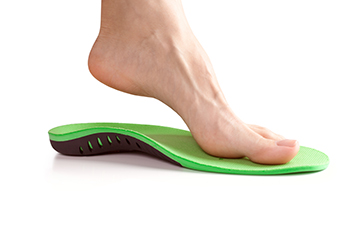
Every foot type requires the right support to stay healthy and comfortable. People with flat feet often need firm arch supports that help distribute weight evenly and prevent excess strain. Those with high arches usually benefit from cushioned supports that absorb shock and reduce pressure on the heel and ball of the foot. Individuals with normal arches are best served by moderate support that maintains balance and stability. While store-bought inserts may offer temporary relief, they are not designed for the unique structure of your feet. Custom orthotics created by a podiatrist provide precise correction, improved alignment, and long-lasting comfort. They can also help prevent problems, such as plantar fasciitis, tendonitis, and joint pain. If you are experiencing discomfort or want to protect your foot health, visiting a podiatrist for an evaluation and discussing custom orthotics is suggested.
Custom orthotics and shoe inserts are not just for cushioning the soles; they are about supporting the foundation of our body - our feet. The advantages extend far beyond immediate relief from discomfort. These personalized solutions, that Our doctors can prescribe, can significantly impact a person’s posture, alleviate pain in various parts of the body, and even enhance athletic performance.
As we lace up our shoes each day, having the right support can make a world of difference. Custom orthotics are like tailored suites for our feet, offering a bespoke solution to address our unique biomechanical needs. They provide stability where it is lacking, correct imbalances, and ensure that every step is a confident and pain-free one.
Custom orthotics and shoe inserts offer long-term health benefits. By addressing issues such as overpronation or underpronation, heel pain, plantar fasciitis, etc. orthotics can help prevent injuries and mitigate the progression of existing conditions. It’s an investment not just in the present, but in the future health of your feet and consequently, your overall well-being.
If you have any questions please contact one of our offices located in Allentown, Easton, Northampton, and Chew Street in Allentown, PA . We offer the newest diagnostic and treatment technologies for all your foot and ankle needs.

Living with diabetes and elevated blood sugar can quietly harm the feet in ways that are easy to overlook. Over time, excess glucose can injure the nerves, leading to tingling, numbness, or burning sensations. This makes it harder to detect small cuts, blisters, or irritations, which can turn into more serious problems, if not treated quickly. High blood sugar also weakens circulation by narrowing blood vessels, reducing the delivery of oxygen and nutrients needed for healing. With slower recovery, even minor skin cracks or sores can become infected. The combination of poor sensation and impaired blood flow increases the risk of ulcers and long-term complications. Daily foot checks, wearing supportive footwear, and maintaining stable blood sugar levels are crucial steps in preventing these problems. If you have diabetes, it is suggested that you visit a podiatrist regularly to ensure that changes in your feet are caught early and managed with the right care.
Diabetic foot care is important in preventing foot ailments such as ulcers. If you are suffering from diabetes or have any other concerns about your feet, contact one of our podiatrists from PA Foot & Ankle Associates. Our doctors can provide the care you need to keep you pain-free and on your feet.
Diabetic Foot Care
Diabetes affects millions of people every year. The condition can damage blood vessels in many parts of the body, especially the feet. Because of this, taking care of your feet is essential if you have diabetes, and having a podiatrist help monitor your foot health is highly recommended.
The Importance of Caring for Your Feet
- Routinely inspect your feet for bruises or sores.
- Wear socks that fit your feet comfortably.
- Wear comfortable shoes that provide adequate support.
Patients with diabetes should have their doctor monitor their blood levels, as blood sugar levels play such a huge role in diabetic care. Monitoring these levels on a regular basis is highly advised.
It is always best to inform your healthcare professional of any concerns you may have regarding your feet, especially for diabetic patients. Early treatment and routine foot examinations are keys to maintaining proper health, especially because severe complications can arise if proper treatment is not applied.
If you have any questions, please feel free to contact one of our offices located in Allentown, Easton, Northampton, and Chew Street in Allentown, PA . We offer the newest diagnostic and treatment technologies for all your foot care needs.

A plantar fascia rupture is a painful injury that occurs when the strong band of tissue supporting the arch of the foot tears. A plantar fascia rupture may occur during athletic or forceful activities. People commonly describe a sudden, sharp tearing sensation in the sole, followed by swelling and bruising in the arch. Walking becomes very difficult, and a noticeable limp often develops. Those with flat feet, tight calf muscles, or a history of plantar fasciitis are at higher risk for rupture. An MRI scan may help to confirm whether the tear is partial or complete, since standard X-rays will appear normal. While surgery is rarely needed, proper management is essential to reduce pain and restore mobility. A podiatrist can provide evaluation, ensure an accurate diagnosis, and guide a safe return to activity. If you have injured the plantar fascia, it is suggested that you schedule an immediate appointment with a podiatrist for an exam and appropriate treatment.
Plantar fasciitis is a common foot condition that is often caused by a strain injury. If you are experiencing heel pain or symptoms of plantar fasciitis, contact one of our podiatrists from PA Foot & Ankle Associates. Our doctors can provide the care you need to keep you pain-free and on your feet.
What Is Plantar Fasciitis?
Plantar fasciitis is one of the most common causes of heel pain. The plantar fascia is a ligament that connects your heel to the front of your foot. When this ligament becomes inflamed, plantar fasciitis is the result. If you have plantar fasciitis you will have a stabbing pain that usually occurs with your first steps in the morning. As the day progresses and you walk around more, this pain will start to disappear, but it will return after long periods of standing or sitting.
What Causes Plantar Fasciitis?
- Excessive running
- Having high arches in your feet
- Other foot issues such as flat feet
- Pregnancy (due to the sudden weight gain)
- Being on your feet very often
There are some risk factors that may make you more likely to develop plantar fasciitis compared to others. The condition most commonly affects adults between the ages of 40 and 60. It also tends to affect people who are obese because the extra pounds result in extra stress being placed on the plantar fascia.
Prevention
- Take good care of your feet – Wear shoes that have good arch support and heel cushioning.
- Maintain a healthy weight
- If you are a runner, alternate running with other sports that won’t cause heel pain
There are a variety of treatment options available for plantar fasciitis along with the pain that accompanies it. Additionally, physical therapy is a very important component in the treatment process. It is important that you meet with your podiatrist to determine which treatment option is best for you.
If you have any questions, please feel free to contact one of our offices located in Allentown, Easton, Northampton, and Chew Street in Allentown, PA . We offer the newest diagnostic and treatment technologies for all your foot care needs.

